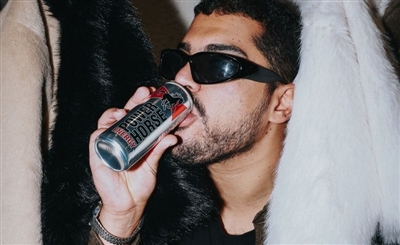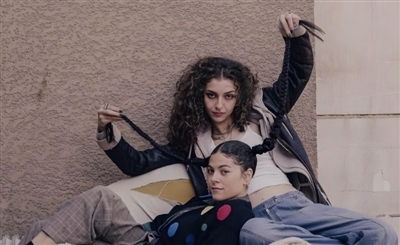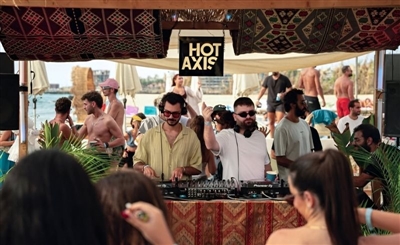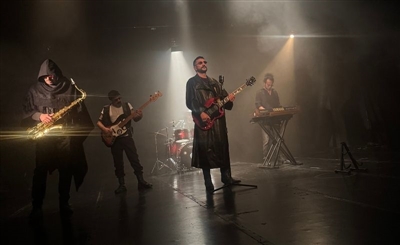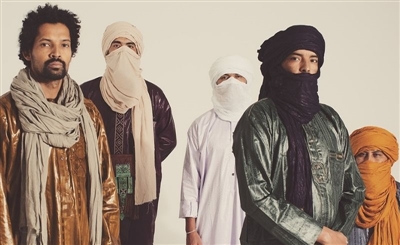ABOsahar: King of Egyptian Trobby Music
He comes from El Minya, and he plays shaabi on a desktop computer.
“I’ve loved creating sound ever since I was a kid. I used to make sound using elastic bands as strings on cardboard boxes; I would often hum and sing for my grandfather,” Ashraf Abu Zeid aka ABOsahar told us when we met in Cairo’s Hizz studio, where he’s currently cutting his debut album. Hizz is a Cairo and Detroit based collective that hosts artist residencies, and are also establishing themselves as a record label and store. ABOsahar is one of the first artists that they took notice of. Hailing from the Upper Egyptian city of El Minya, the electronic musician certainly comes from humble beginnings. “I used to live with my grandparents on their farm, without a television – we just had a radio,” he says, delivering his story in slow, reticent phrases.
<iframe width="560" height="315" src="https://www.youtube.com/embed/i0-kxnbCx24" frameborder="0" allow="accelerometer; autoplay; encrypted-media; gyroscope; picture-in-picture" allowfullscreen></iframe>
Though we had been fans of this obscure Minyan artist's work on SoundCloud, the first time we saw him perform was on the roof of one of the earlier Hizz houses, in Garden City. With a TV screen lying flat on the table in front of him, a large portrait of himself as desktop, ABOsahar went about wrestling with a knot of cables. Finally set up, he proceeded to pump his own brand of psychedelic internet shaabi through the speakers, typing out synthesized instrumental melodies on his computer keyboard over minimized, echo-laden darbouka and trap rhythms, for a small, but notably entertained audience. Eventually, he starts to sing, sending hushed verses through a mic soaked in reverb and delay. He hands the mic off to someone in the audience, who improvises some lines about hashish. ABOsahar records this, looping it into his song, cutting and pasting different sounds and words to computer keys, thus the guest singer's voice into an instrument on the spot.
While Cairo and Alexandria are considered Egypt’s hubs of contemporary music, ABOsahar is proof that if you cast the net wider, you’ll invariably find pockets of musical activity that go beyond the usual traditional forms. Though a big part of creating music is access to resources, Abo Sahar shows that if there’s a will there’s a way.

“I never let these limitations hold me back. I used to make music out of plants! That’s how it all started for me, and I find that to be the ultimate way of saying that nothing will stop me from doing what I love - even with the least resources available to me.”
For any budding Egyptian musician outside the big city, moving to Cairo seems like a no-brainer. But even knowing well that it will inevitably open new avenues for him, this hasn’t stopped Abo Sahar from pursuing his passion from his hometown, as he always has; in fact, what makes his music so unique is the fact that it’s a product of his environment, upbringing and his first exposure to music.
“My late uncle was a DJ,” he told us. “I’d go into town every Thursday to help him out at weddings. I eventually took over for him when I was in high school and I started singing too.”
It’s from here that his musical path began to take shape and, despite resources still very much being in short supply, he made do with what he had.
<iframe width="560" height="315" src="https://www.youtube.com/embed/b-qawTQtOZ0" frameborder="0" allow="accelerometer; autoplay; encrypted-media; gyroscope; picture-in-picture" allowfullscreen></iframe>
“I started mixing songs using Jet Audio and Mixcraft. My friend introduced me to FL studio, but I only had the demo version, so I had to record everything I did on Mixcraft so I don’t lose it. Then I’d upload it to the Tara2i3o forum, the only place where I could do that at the time.”
Channelling that kid who used plants, elastic bands and cardboard boxes to make music, Abo Sahar's DIY-approach stretched well into his adult years in the most peculiar of ways.
“Once I started using my computer to make music, I figured why not use the computer’s keyboard as an instrument like the synth, oud or flute?” he told us quite nonchalantly. “Because if I have to play an actual keyboard, I’d have to be musically trained and I’m not. I’m all about simplifying things, that’s what my trobby style is about,” he continues, referring on what has become his trademark sound. “It’s free flowing music.”
<iframe width="100%" height="300" scrolling="no" frameborder="no" allow="autoplay" src="https://w.soundcloud.com/player/?url=https%3A//api.soundcloud.com/tracks/479449635&color=%23050519&auto_play=false&hide_related=false&show_comments=true&show_user=true&show_reposts=false&show_teaser=true&visual=true"></iframe>
It’s this free-flowing approach that has given trobby music such a unique sound – one that defies genre and, occasionally, logic. It is, as he says, rooted in simplicity but with a twist that is so personalized and enjoyable, it sparks the imagination. ABOsahar is no snob either; he seems as comfortable playing for a wedding or in a venue as he does sitting at a desktop in a Mounira apartment, jamming away for a few beer sipping Hizz members and associated friends.
“I don’t care about classifying the music I’m making; it was always about just putting my work out there for people to listen to. I couldn’t care less if the drums sounded Western or Eastern, I just wanted to create new sounds and combine opposites.”
Existing seemingly outside the parameters of electro shaabi, or anything else for that matter, ABOsahar isn’t the kind to be pushing his ‘brand’ on social media – he barely even uses it. His Instagram belies a quirky sense of humour, depicting scenes of nature, life in El Minya, his desktop computer "DJ setup", and a lot of pictures of fire. He uses SoundCloud and YouTube to upload his work, at quite a rapid rate, and without any fuss - the last one merely days ago, and before that, a week. Whether by luck or design, these uploads quickly found their way well beyond El Minya – and even beyond Egypt.
“The people who probably showed the most interest in my music first were foreigners and people like Hizz,” he recalls. “That’s probably what brought me to Cairo. They included my tracks in their Mahraganat mixtape before we had even established any kind of contact. Even Kareem Lotfy told me that he hears my music everywhere.”
In this day and age, there’s something quite noble and pure about a musician resisting the bright lights of a capital city. An Egyptian artist’s distance from Cairo may be good for their innovative process, but poses a real obstacle for their exposure – something that isn’t lost on ABOsahar.
“The fact that I’m based so far from Cairo has always held back my exposure," he admits, understanding that being in Cairo would benefit his career. “I was meant to visit here a long time ago, and when I did for my first gig I got a great reaction. That’s partly because people didn’t expect this kind of music to come out of Upper Egypt. I just need the exposure so I can keep making music. It doesn’t matter where I am; if I’m on Mars, I’ll still keep making music.” That's something we'd like to hear.
<iframe width="560" height="315" src="https://www.youtube.com/embed/C70cM_3QyZc" frameborder="0" allow="accelerometer; autoplay; encrypted-media; gyroscope; picture-in-picture" allowfullscreen></iframe>
ABOsahar hasn’t been resistant to Cairo, but more indifferent to it. At one point, slowly smoking a cigarette on the Hizz balcony overlooking Kasr Al-Aini, he muses about the incessant noise of Cairo compared to El Minya, which "let's you think." However, the big city has certainly influenced his music, even if through emotion, theme or topic.
“There’s this track on the album about when I first arrived to Cairo and saw the hustle and bustle,” he reveals of the still unfinished album. “It’s basically about that car ride from the train station to the studio. Also the first track on the album is one where I sing about my own life, sort of as an introduction instead of jumping straight to the music.”
ABOsahar’s approach to music is one based on self-satisfaction and little else. Though he still DJs at weddings, music isn’t a job to him – it’s the only avenue for self-expression that has ever been presented to him.

“Music is a mood for me. I never work on music unless I’m in this certain mood. I can do nothing for a week, but once that mood hits me, I’m on it.”
While he’s still very much entrenched in the same methods, Cairo has provided him with a wider scope for these methods – think of it as a painter being introduced, not to new brushes, but to new colours.
“One of my favourite things to do is record my own samples. There’s this one guy I caught walking around the streets playing the tabla. I recorded him and used it on the album. I sampled and used a lot more stuff too.”
This new scope, these new colours so to speak, have put him on a new trajectory, as he, for the first time, begins to evolve his sound.
“The album is filled with new sounds and melodies and it’ll be different from anything I’ve ever done before. Things that fall in line more with my track ‘Old Stuff New in This Way’ or the 'KHALEET' set I recorded for Hizz. I’ll also be using vocals as an instrument like I did before but I’ll do it differently this time.”
Despite the effects of his new environment, ABOsahar is still at his best when he’s isolated. He’s a lone wolf if ever there was one and shows little interest in becoming another cog in a community he sees as running too much like clockwork for his taste, lest his indefinable music fall victim to classification. The way he does that is stay grounded to his roots.
<iframe width="100%" height="300" scrolling="no" frameborder="no" allow="autoplay" src="https://w.soundcloud.com/player/?url=https%3A//api.soundcloud.com/tracks/119573951&color=%23ff5500&auto_play=false&hide_related=false&show_comments=true&show_user=true&show_reposts=false&show_teaser=true&visual=true"></iframe>
“I still carry with me the same inspiration I got from El Minya. The influence would’ve been greater if I gave up to the noises around me here in Cairo, but once you isolate yourself it’s gone. Especially since I don’t even meet people here.”
It's hard to pin down the unadulterated artistry that characters like ABOsahar possess. There is something truly pure about the way that he creates; it foregoes any pretense - watching him make music is more akin to watching a child at play, in the best way, then someone "perfecting their craft", for example. His approach feels organic, untainted by expectations of fitting into a certain aesthetic or portraying himself in a specific way. He regularly uploads tracks to Soundcloud without any fuss - the last one merely days ago, and before that, a week. There are not many artists that can maintain such a playful, primal relationship with their craft, which is exactly what makes ABOsahar so special.

Follow ABOsahar on Facebook, Soundcloud and Instagram.
- Previous Article Getting Abyusif
- Next Article 23 Must-Watch Middle Eastern Music Documentaries
Trending This Month
-
Jan 29, 2026



